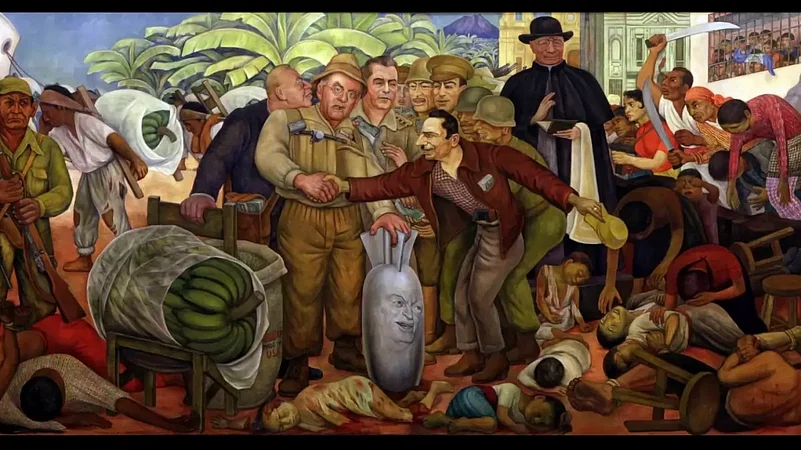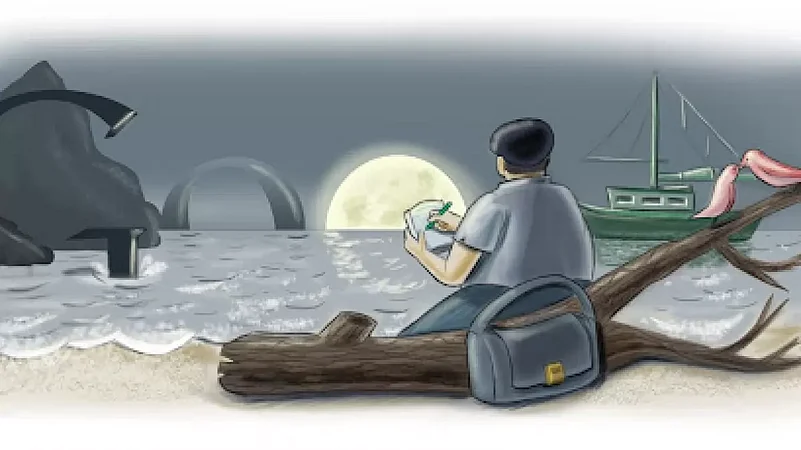On September 30th, it was International Translation Day, while September 23rd marked the 50th death anniversary of one of the finest and greatest poets of the 20th century, the Chilean Pablo Neruda. Neruda was a Nobel Prize-winning poet who was also a one-time Chilean Communist Party senator. The last days of Neruda were spent under Chile’s worst military dictatorship of General Augusto Pinochet. No one was allowed to attend Neruda’s funeral. This tribute to Neruda on International Translation Day, a half-century after his death will consist of two parts: one of his lesser-known political poems and a poem by way of a subcontinental tribute to him.
Neruda’s aforementioned poem simply titled United Fruit Company written in 1950 harks back to the days when the infamous multinational company not only came to control vast tracts of land in Central and South America in the opening decades of the last century, but also the political destinies of these lands so much so that these countries became little more than ‘banana republics’ referenced to in Neruda’s poem as well; the bananas also being a pun on the chief exports of these countries now controlled by the Company.

The violent suppression of a workers’ strike in 1928 came to be known as the ‘Banana Massacre’; estimates of the number of dead range from 47 to 2,000. The poem will strike a chord with both Indian and Pakistani readers given that united India itself was ruled by a multinational known as the East India Company which made and unmade the governments of Indian princely states and brutalized and terrorized Indian citizens through its blatant policy of divide and rule in the early 19th century in a rapacious and callous manner not entirely different from the United Fruit Company in Latin America a century later.
When the trumpet blared everything
on earth was prepared
and Jehovah distributed the world
to Coca-Cola Inc., Anaconda,
Ford Motors and other entities:
the United Fruit Inc.
reserved for itself the juiciest,
the central seaboard of my land,
America’s sweet waist.
It rebaptized these lands
as “Banana Republics,”
and over the slumbering corpses,
upon the restless heroes,
who conquered renown,
freedom and flags,
it established the comic opera:
it alienated self-destiny,
regaled Caesar’s crowns,
unsheathed envy, drew
the dictatorship of flies:
Trujillo flies, Tacho flies,
Carías flies, Martinez flies,
Ubico flies, flies soaked
in humble blood and jam,
drunk flies that drone
over the common graves,
circus flies, clever flies
versed in tyranny.
Among the bloodthirsty flies
the Fruit Co. disembarks,
ravaging coffee and fruits
for its ships that spirit away
our submerged lands’ treasures
like serving trays.
Meanwhile, in the seaports’
sugary abysses,
Indians collapsed, buried
in the morning mist:
a body rolls down, a nameless
thing, a fallen number,
a bunch of lifeless fruit
dumped in the rubbish heap.
Ahmad Salim, the Punjabi poet, historian, anthologist, archivist, researcher and compiler, is regarded as one of the greatest living Punjabi poets at the moment. In his little-known Punjabi poem Neruda Wapis Aave Ga (Neruda Will Return) written in 1981, eight years after the great Chilean poet’s death, Salim writes:
O cheek cheek ke aakhdi ae
“Main Pablo Neruda di mehboob kurri
Ohda picha nai chaddan gi
Kameena daur gaya si ik din
Mainoon kalyaan chad ke
Te ja lukiya ae ik khandaq vich
Jang mukaa taan main ohnoon
Khandaq vich ja pharaan gi
Dharoh ke baahir liyaavan gi”
Pablo Neruda di mehboob kurri
Bolde bolde
Achanak sofe te dig paindi ae
Te haari hoi aavaaz vich puchdi ae
“Par jang kadon muke gi?”
This belated tribute to Neruda by Ahmad Salim, is being presented here in original English translation on International Translation Day in the hope that it will stimulate new, deserved interest in Neruda’s life and works for the younger generations in the 21st century, and acquaint the uninitiated with the stormy life of one of the greatest benefactors of the Spanish language. It maybe simply read as the sigh of an abandoned beloved or between the lines as a lyrical anti-war poem:
She says screaming
“I am Pablo Neruda’s beloved girl
I will not leave him alone
The scoundrel ran away one day
Leaving me alone
And hid away in a trench
End the war then I will
Bail him out from the trench”
Pablo Neruda’s beloved girl
While talking
Suddenly falls down on the sofa
And in a defeated voice asks
“But when will the war end?”
Raza Naeem is an award-winning translator and researcher based in Lahore, where he is also the President of the Progressive Writers Association. He can be reached at: razanaeem@hotmail.com and tweets at @raza_naeem1979


























